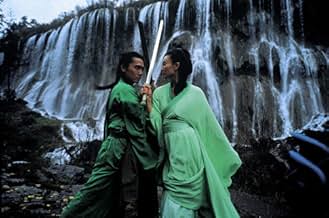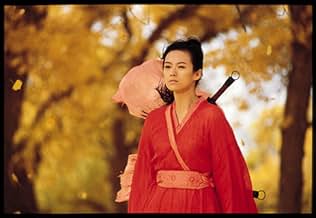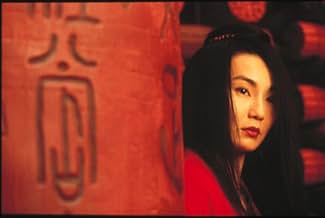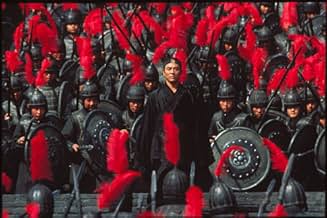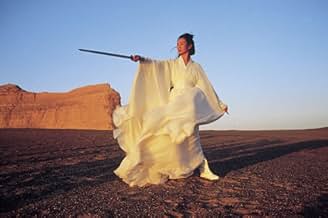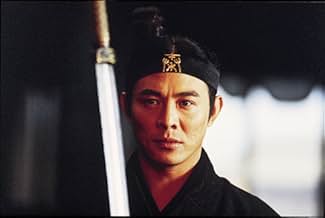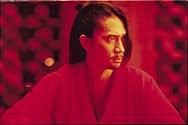एक रक्षा अधिकारी, नेमलेस, द्वारा बुलाया गया था किन का राजा तीन योद्धाओं को समाप्त करने की उनकी सफलता के बारे में।एक रक्षा अधिकारी, नेमलेस, द्वारा बुलाया गया था किन का राजा तीन योद्धाओं को समाप्त करने की उनकी सफलता के बारे में।एक रक्षा अधिकारी, नेमलेस, द्वारा बुलाया गया था किन का राजा तीन योद्धाओं को समाप्त करने की उनकी सफलता के बारे में।
- 1 ऑस्कर के लिए नामांकित
- 46 जीत और कुल 48 नामांकन
- Broken Sword
- (as Tony Leung Chiu-Wai)
- Flying Snow
- (as Maggie Cheung Man-Yuk)
- Moon
- (as Zhang Ziyi)
- King
- (as Chen Dao Ming)
- Scholar
- (as Liu Zhong Yuan)
- Old Servant
- (as Zheng Tian Yong)
- Commander
- (as Zhang Ya Kun)
- Seven Qin Guards
- (as Hei Zi)
फ़ीचर्ड समीक्षाएं
Overall, I didn't think the story was that appealing except for the good message at the end, about the good of all being more important than satisfying one's personal vengeance. Well, who could argue with that? As for the rest, perhaps being a Westerner unfamiliar with Eastern culture, it's harder for me to relate to the mind-set. I would be interested to know how Asians viewed this story, as opposed to similar films.
Sometimes I think these wild Crouching Tiger-like action scenes are too long and overdone, but at least in this film they were very original and, once again, more visuals feasts than anything else. On my second viewing, I discarded the subtitles and went with the dubbed version to concentrate more on the stunning look of this film. It paid off. Even if I don't quite follow everything, each scene is such eye-candy that you can't go wrong viewing this.
Hero is two sides of a tale as presented by Nameless (Jet Li), a mere Prefect who defeated three deadly assassins, and the King of Qin (Daoming Chen), the man the assassins wished to kill. Nameless weaves his heroic though modest story of how he killed the assassins, but the King remains unconvinced, spinning his own version of how he believed events unfolded.
Director Yimou Zhang takes us through Nameless' story first, spreading the battle sequences thick, allowing them to take their own time. In the King's version, certain battles are then revised, which is remarkably brave considering that some battles are utter fabrications. In one such fictitious fight, in a faultlessly designed set, Nameless and Sky (Donnie Yen) close their eyes and fight out the battle within their minds. Screen time is being spent lavishly on showing how two characters contemplated a fight, whilst fighting each other in a battle that never occurred. It is confusing certainly, but perhaps Zhang wished for his audience to get lost in the plot's design so that they would not question the warrantability of half of the battle sequences, which make up most of the film.
Yet, it is difficult to ponder these details when they are made so utterly insignificant when viewing such a spectacle. The sheer beauty of the battles, the gentle floating of the assassins as they fly around their arenas (which range from a forest full of orange leafed trees, crisp leaves falling down to the ground like rain, to the crystal clear and calm of a mountain lake), the costumes of characters at varying stages in the story line (red for passion, green for youth, white for truth, blue for love), the amazing army scenes which feature thousands of arrows being fired into the sky to create a black cloud that descends right on top of the camera, all these elements combine to produce a faultlessly perfect image on the screen, each frame a worthy photograph that gently reminds you why cinema is the greatest art form of the twentieth century.
And characterisation is not lost in this beauty as one may have feared. Despite the irritating two dimensional performance of Zhang Ziyi as Moon, the other actors carry off fine performances, especially Tony Leung Chiu Wai as Broken Sword and Daoming Chen as the King. Their performances are especially credible as they are often drowning in the memories of the King and Nameless - they need to change slight mannerisms in order to reflect whose mind they are now in.
The script too is of an impressively high standard. The moments of clarity that the warriors feel are experienced by the audience also, and there are some very informed outlooks of the emptiness of warfare, communicating that to achieve peace, sometimes war is the only option. These messages of course seem fitting in our current times, underlining how ancient some of the methods of our governing body truly are.
Hero is undoubtedly a most beautiful and awe inspiring film. What it lacks in plot substance, it makes up for with structure and script. It elaborates on the ground work created by 'Crouching Tiger' and is an experience that I would encourage you to seek out, as long as you are willing to submit to the film and let it guide you through its world on its own terms.
Rating: 4/5
Kurosawa is here obviously in the story: it is half 'Rashomon' and half 'Ran.' But more important is Kurosawa's theory of film as a device to capture space. As with Parisian impressionist painters, the thing painted is not the point. It provides an origin only; the painting is about all the magical things that happen in the space between the subject and the viewers eye. The paintings, and Kurosawa's films are about that space.
Kurosawa invented the technique of shooting from very far away with a telephoto so as to flatten space, and at the same time creating (usually three) layers of space. Often, he would engage the space directly.
This masterful film is obsessive about the point and may be the most lush swim in dimensional space you are likely to find with the technology we have. Every shot is oriented around not the action, but the space that contains the action. Falling water, dust, lots of blown fabric and hair, feathers, arrows, even book tablets and those leaves! With lots of bamboo screens, all these are used to show the space, plus the usual fantastic mountains, clouds and forests - even at the end the Great Wall and of course the moving waves of soldiers and courtiers.
Many of the architectural shots are lifted from Welles' "Othello."
The matter is not lost in the copious allusions to mental space: the game of Go, music, calligraphy, politics, and love. All these are defined, exercised and conflated with one another in terms of space and the intrigue of space with a little more effort in the latter items on the list. Then, waving lamps are used to make 'murderous intent' spatial.
Unlike 'Crouching Tiger' which this resembles not at all, the camera is static, not dancing. Where Lee emphasized the ballet of the fight by engaging his camera, Zhang stands back in the space. Where Lee conceives fights not among the participants but their masters, Zhang shows us not the fights, but the battles among the true worlds of the fights - the worlds of different colors.
What we see could be the imaged Go game, or the imaged fight within it, or the imaged story Nameless tells, or the one the King tells and on and on with nestings of imaginations.
Every nation creates their own movie to explain themselves. We in the US seem to like more militarist stuff. Except for the thuggish motive (my war for my kind of peace), we would do well to have stories about stories like this one through four layers until they reflect back on the origin. Complex story space in rich real space.
If you are going to see this, you really must see 'In the Mood for Love,' which features Broken Sword and Flying Snow in something of the same relationship they have here. It is one of the best films ever made and truly spatial in a purely Chinese manner. It will completely transform your enjoyment of this.
Ted's Evaluation -- 3 of 3: Worth watching.
The imagery is unparallelled, simply draw-droppingly near perfect scenes, with bold and vibrant use of colour, symbolism and scenery. The fluent flow of the storyline, the delicate direction of the sword slicing action, the Chinese cultural concepts and the emotionally charged scenes between characters combine to produce a simply remarkable achievement.
This film has a few elements from Crouching Tiger Hidden Dragon, but is far, far superior in every way. The sleek direction from Yimou Zhang is so perfectly done, just imagine two martial arts experts ensuing in battle against each other, defying the laws of physics as we know it, and yet following them in 360 degrees in slow motion as one deflects a droplet of rain from one sword to the other, at the same time spinning and leaping over water... simply beautiful. The attack sequences are also superbly set, with hundreds of thousands of the King's warriors in formation, simultaneously firing enough arrows into the city which literally cover the sky, in addition to the viewer being able to watch the journey of a single arrowhead aimed during this event. The build up to the attack along with the unnerving tune of a Chinese stringed instrument help you, as the audience, to become firmly engrossed in your seat.
The individual martial arts is also second to none, for myself particularly to see the distant shots of the whole battle sequence showing the true skills involved with fighting, such as footwork, perfect timing,aggression, counter attacks and defence. Jet Li shows he is truly the grand daddy of martial arts. I cannot stress enough how much you need this film in your life.
The colourful imagery imposed by the director will take your breath away with luscious, vivid, bright, wind-blown,draped backgrounds as the setting for the important progression of the story. Even the story itself is brought to the audience in such a way which ensures your undivided attention, as there are twists in the tales and hidden plots which do not develop until the end of the film.Even short individual scenes are memorable due to their sheer awesome display of skill and speed.
This film even holds a political message which is relevant to all times, especially in today's American-lead world dominance. This film has absolutely everything - including an extremely sexy young Ziyi Zhang who simply is the biggest hype to come out of china since SARS.
This film was released in 2002, but this is certainly one of my all time favourites and will probably be the best film I see all year. I have never been more enthusiastic to pursue films in this genre in my life. For more action type enthusiasts who like more gore and violence check out 'Ong Bak', but for people who appreciate a fuller, visionary piece of martial arts filming, this will leave you speechless.
क्या आपको पता है
- ट्रिवियाThe "red fight" between Moon and Flying-Snow was filmed in a forest in Mongolia. Director Yimou Zhang had to wait until the leaves turn yellow, and hired local nomads to gather even more yellow leaves in order to cover the ground completely. In fact, he was so fanatic about the leaves, that he had his crew separate the leaves into four different "classes" which were each put at increasingly farther lengths from the camera.
- गूफ़At the beginning of the movie, subtitles state that China was divided into seven warring states. At the end, the subtitles then state that "the King of Qin" unified China, without specifying which one. Historically, the king that was the one to unite all of the Chinese states was Ying Zheng (later changed name to Shi Huang Di) who inherited the throne from his deceased father at age 13 (as opposed to the age of the king in the movie). At the time, Ying Zheng began to rule China, the seven states were already reduced to two larger states (Qin and Chu) which was later dominated by Qin when Ying Zheng was 22 years old. It is therefore impossible for the same king shown in the movie to be the king that united all the Chinese states, although the end-note is semantically correct.
- भाव
King of Qin: I have just come to a realization! This scroll by Broken Sword contains no secrets of his swordsmanship. What this reveals is his highest ideal. In the first state, man and sword become one and each other. Here, even a blade of grass can be used as a lethal weapon. In the next stage, the sword resides not in the hand but in the heart. Even without a weapon, the warrior can slay his enemy from a hundred paces. But the ultimate ideal is when the sword disappears altogether. The warrior embraces all around him. The desire to kill no longer exists. Only peace remains.
- इसके अलावा अन्य वर्जनThe Director's Cut was 107:15 minutes, compared to the theatrical version at 96:23 minutes.
- कनेक्शनEdited into Ying xiong: Cause - The Birth of Hero (2002)
टॉप पसंद
- How long is Hero?Alexa द्वारा संचालित
- Why did the king tell his own version of events if he didn't even know what happened until just a few moments ago when he realized Nameless' plan?
- Was the king a dictator?
- Did the king really had to kill Nameless at the end?
विवरण
बॉक्स ऑफ़िस
- बजट
- $3,10,00,000(अनुमानित)
- US और कनाडा में सकल
- $5,37,10,019
- US और कनाडा में पहले सप्ताह में कुल कमाई
- $1,78,00,000
- 29 अग॰ 2004
- दुनिया भर में सकल
- $17,73,95,557
- चलने की अवधि1 घंटा 47 मिनट
- रंग
- ध्वनि मिश्रण
- पक्ष अनुपात
- 2.35 : 1
इस पेज में योगदान दें





